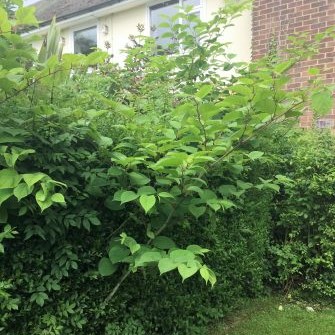 Homeowners who sell a property with Japanese knotweed and fail to declare it to the buyer could potentially face legal action, according to new research by invasive plant specialists Environet.
Homeowners who sell a property with Japanese knotweed and fail to declare it to the buyer could potentially face legal action, according to new research by invasive plant specialists Environet.
A YouGov survey of over 2,000 people showed that almost two thirds – 63% – would sue the seller if a property they bought was later discovered to have Japanese knotweed that had not been declared prior to the purchase.
Sellers are legally obliged to carry out proper checks before stating on the Law Society’s TA6 form, which is completed as part of the conveyancing process, whether the property is affected by knotweed, including “rhizome (root) present in the ground of the property, or within 3 metres of the boundary, even if there are no visible signs of above ground growth.”
In legal cases, experts can usually determine approximately how long knotweed has been present in the ground and whether attempts have been made to treat it in the past, making it difficult for sellers to claim ignorance.
Despite the risks, more than half – 53% – of sellers would carry out insufficient checks, for example having a quick glance round the garden – 21% – or doing nothing at all – 14%. Even if sellers are familiar with the plant, the appearance of which varies significantly through the year, without digging up the ground it’s difficult to say for certain whether knotweed is present, including dormant rhizome that could suddenly begin to regrow if disturbed.
Earlier this year, a homeowner in Raynes Park, London, who found Japanese knotweed behind the garden shed after he moved into his £700,000 property, successfully sued the seller for more than £200,000 in costs and damages. The seller, who had answered “No’ to the knotweed question on the TA6 form, claimed in court that he wasn’t aware of the knotweed infestation and ‘reasonably believed’ he was telling the truth when he did so, but the judge determined that he had made a misrepresentation and was responsible for the diminution in the property’s value and legal fees.
Nic Seal, founder and MD of Environet, said: “It’s the seller’s duty to disclose knotweed and any false information, even if given to the best of their knowledge, could lead to a misrepresentation claim. It’s clear from this research that most sellers aren’t carrying out proper checks and are leaving themselves open to the risk of future legal action.
“Knotweed now affects around 5% of UK homes, so while it might be tempting to cross your fingers and hope for the best, if it later arises you could be liable for hundreds of thousands of pounds. The only way to confidently state that a property is unaffected is to commission a professional Japanese knotweed survey, backed by a warranty.”
If a seller is unable to declare their property knotweed-free, stating “Not known” on the TA6 form passes responsibility to the buyer to undertake their own enquiries or otherwise accept the risk. Yet the research also showed only 32% of buyers would arrange a professional Japanese knotweed survey if the seller was unable to provide reassurances – and if knotweed later arose, pursuing a successful legal case against the seller in those circumstances would be much more challenging.
Seal added: “It might be tempting for sellers to simply state that they don’t know if their property is affected by knotweed. But if a buyer can prove they did know, for example if knotweed would have been clearly visible or some effort was made to treat or conceal it, they could still be sued for a potentially life changing sum of money.”


Quite right too.
You must be logged in to like or dislike this comments.
Click to login
Don't have an account? Click here to register
Hang on, if a seller honestly looks and believes that there is no knotweed, how can they still be sued? Assuming that the survey done shows it was only newly arrived (even if just prior to the exchange and completion when a seller could legitimately not see it) and there was no attempt to treat or remove it, giving weight to the sellers defence of ignorance, would the buyer have to cover the sellers legal costs? And how long does the liability last?
Obviously if a seller has knowingly lied or tried to hide it then they should be legally required to pay the costs of removal and treatment.
You must be logged in to like or dislike this comments.
Click to login
Don't have an account? Click here to register